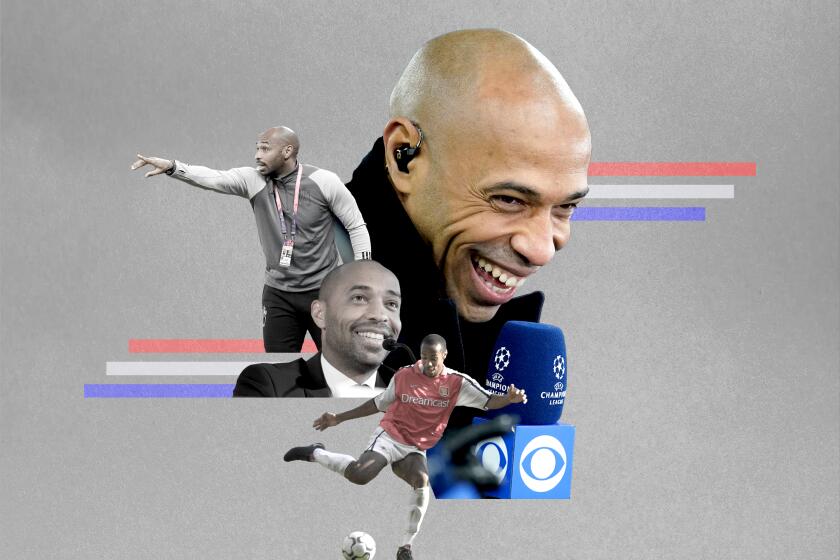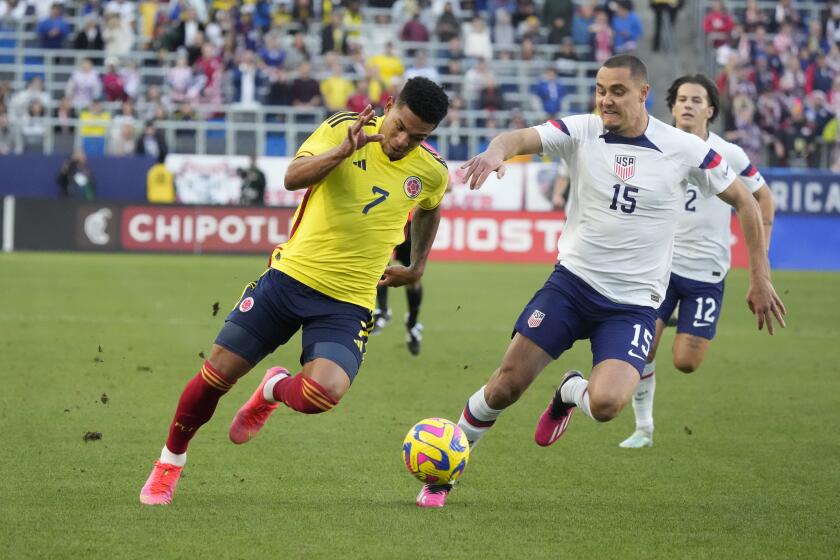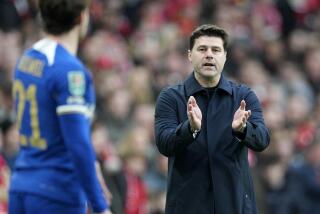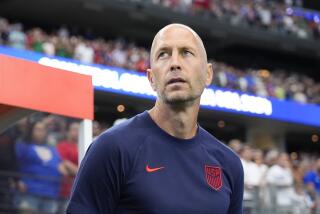Commentary: Pep Guardiola should leave Manchester City before sanctions tarnish his legacy
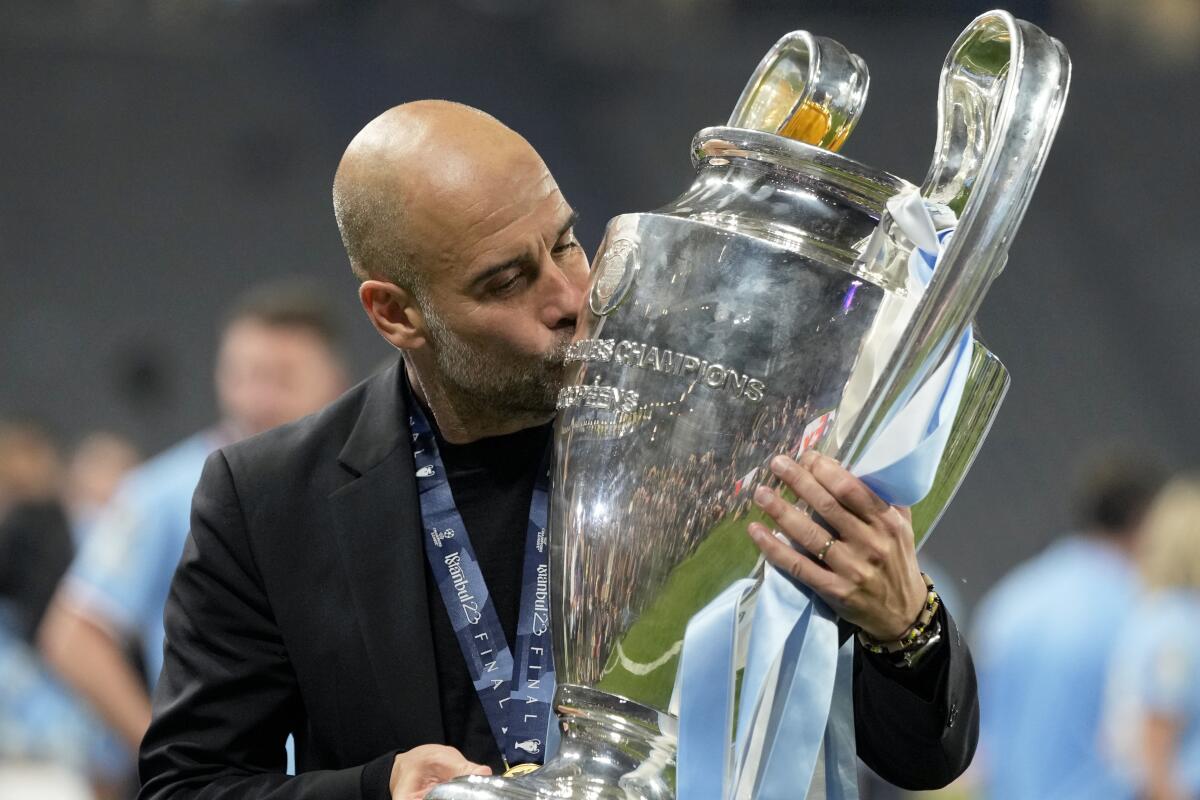
- Share via
With Saturday’s 1-0 win over Inter Milan in the UEFA Champions League final, Manchester City’s pursuit of the one prize it was missing is at long last over. And it had been an epic quest, not unlike King Arthur’s hunt for the Holy Grail or Captain Ahab’s pursuit of that white whale.
That last one didn’t work out so well for the dear captain, by the way, so this may be a good idea to pause and consider the immediate future of City’s captain, manager Pep Guardiola, now that his team’s lengthy drama has ended.
The coach, who recently signed a two-year contract extension, said recently he had no intention of leaving Manchester City before 2025 and no intention of staying beyond then. But after Saturday’s win, what’s the point of waiting?
City had a historic season, becoming just the second English club to win a treble, capturing league, domestic cup and Champions League titles in the same season.
Only seven other clubs have done that, including Guardiola’s 2008-09 Barcelona team, which makes him the only manager in history to have done it twice. Yet none of those teams repeated the feat within the next five seasons, which means City has no way to go but down.
Guardiola’s next season in Manchester will be his eighth. That’s twice as much as he’s spent in any other job. And he’s constructed a dynasty there, winning five of the last six Premier League titles. Over that same span, it won six domestic cups and played in two Champions League finals. And the team is set up to continue succeeding: Of the 13 players Guardiola used in Saturday’s final, only one, Ilkay Gundogan, is out of contract and just three are older than 29.
Thierry Henry struggled to translate his killer instinct as a player into the right coaching tone. He’s ready for another shot, but will anyone call?
But the bill for all that success is about to come due. After a four-year investigation, the Premier League has charged Manchester City with breaking financial fair play rules more than 100 times between 2009 and 2018. The rules are designed to ensure clubs don’t spend more than they earn, preventing deep-pocketed owners such as City’s Sheikh Mansour bin Zayed bin Sultan Al Nahyan from drowning the rest of the competition in their oil money.
The EPL says City provided inaccurate financial information to make it look as if it was complying with the rules when it was flouting them instead. The team has denied any wrongdoing and the case has been referred to an independent commission for final judgment, with the possible punishment beginning with a points deduction and escalating from there.
For Guardiola, the embarrassment could be worse than the penalties.
When the violations were first revealed in February, Guardiola promised to resign if assurances he received from club leadership that the charges were untrue proved to be lies. He has since reversed course and promised to stay, just as he did three years ago when City was charged by UEFA, the continental governing body for soccer, with cooking the books. The team appealed UEFA’s findings to the Court of Arbitration for Sport and won.
The club may not be so lucky this time. So why would Guardiola want to stay and risk his reputation amid the maelstrom that is sure to come?
Just 52 and a winner of three Champions League crowns, 11 league titles and 13 domestic cups in Spain’s La Liga, the German Bundesliga and the EPL, Guardiola would immediately become the hottest commodity in the coaching market if he stepped away. Still ambitious despite having conquered the top three leagues in Europe, Guardiola would undoubtedly be handed a blank check by Nasser bin Ghanim Al-Khelaifi, another oil-rich owner whose own quest of winning a Champions League title at Paris Saint-Germain has repeatedly ended in frustration.
Or perhaps, after his astounding success with proven teams such as Barcelona, Bayern Munich and Manchester City, the chance to build something new in Italy’s Serie A would appeal to him.
But what about leaving the club game altogether for a national team and the chance to win the sport’s biggest prize, a World Cup?
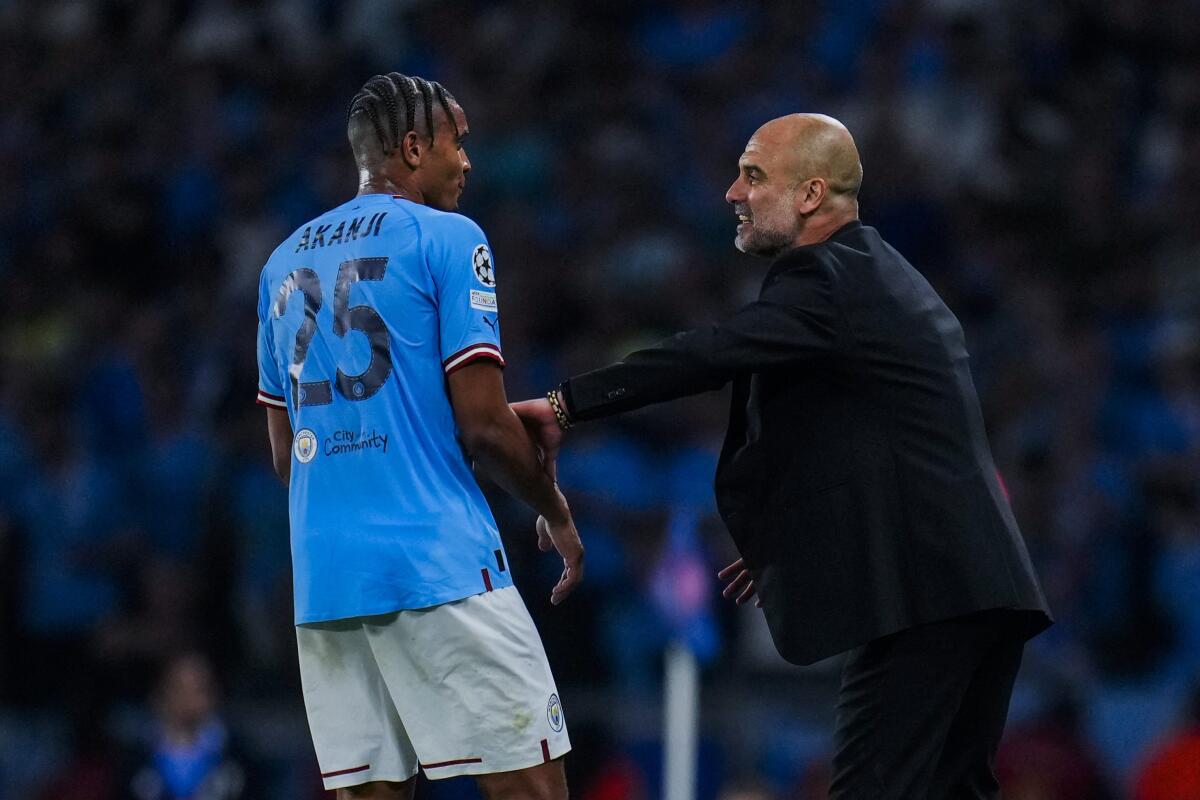
Of the top 20 teams in FIFA’s latest world rankings just two, Brazil and the U.S., have interim managers three years out from the next World Cup. And neither is likely to wait until 2025, a year before the tournament to hire a permanent manager, even if it is Guardiola.
The U.S. job could be particularly intriguing. Although the federation’s proposed budget for the 2024 fiscal year calls for an operating deficit of more than $9.4 million, it also projects record revenues of $172.7 million. Certainly the federation’s pockets are deep enough to make a run at Guardiola, perhaps even funding it from sponsorship tie-ins linked to the World Cup’s return to the U.S. in 2026.
The low risk and high reward of coaching the USMNT at home might be just the kind of challenge Guardiola is looking for. It’s low risk because the U.S. has gone beyond the round of 16 just once in the modern era, meaning simply getting out of the group stage could be considered a success. The reward, on the other hand, would be exceptionally high if he defies expectations and takes the team beyond the final 16.
The open U.S. job has previously been linked to other big-name coaches, among them Zinedine Zidane and José Mourinho, but those rumors were always more conjecture than fact. Guardiola is an even bigger long shot.
For starters, the chasm between the club game and international soccer can be difficult to bridge, as Guardiola surely knows. At City — and at Barcelona and Bayern Munich before that — Guardiola had the money and support to go out and buy the players that would fit his demanding system. Of the 13 players Guardiola used in Saturday’s final, only one, substitute Phil Foden, came up through City’s academy system. The team spent more than $740 million in transfer fees to acquire the others.
That approach won’t work with a national team, where you’re limited to players who carry the same country’s passport.
The U.S. Gold Cup roster features 18 players who are not on the Nations League roster, giving interim manager B.J. Callaghan a look at a range of players.
Additionally, club coaches work with their players every day for more than 10 months each season, an environment that favors Guardiola’s emotional and motivational approach. Although his demand for perfection can be abrasive, he is passionate and warm with his players, and that works best when players experience it on a daily basis.
National team coaches, on the other hand, are rarely on the field with their players more than 10 days at a time. That can make it difficult to build a relationship, much less teach a complicated playing style.
Despite his promises, Guardiola has a choice to make: Should he stay or should he go now?
The next few months could prove to be another epic drama.
⚽ You have read the latest installment of On Soccer with Kevin Baxter. The weekly column takes you behind the scenes and shines a spotlight on unique stories. Listen to Baxter on this week’s episode of the Corner of the Galaxy podcast.

